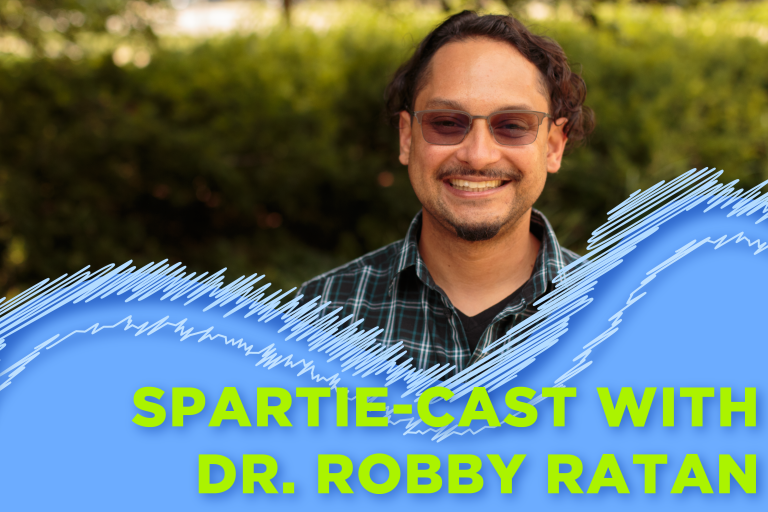Rabindra Ratan, associate professor and AT&T Scholar at Michigan State University’s Department of Media and Information, was having conversations with colleagues around the world — about virtual reality, psychological effects of avatars and the impacts of the metaverse.
And in January 2021, he found a way to capture and amplify those illuminative discussions to the world. Enter: SPARTIE-Cast.
“I realized that I had been having excellent conversations with my colleagues through Zoom and had this great opportunity to share the ideas we were discussing with a wider audience,” Ratan said.
The podcast’s main goal is to broadcast the efforts and ideas of the Social and Psychological Approaches to Research on Technology-Interaction Effects (SPARTIE) Lab. Directed by Ratan and housed with the College of Communication Arts and Sciences, the SPARTIE Lab performs research on the effects of human-technology interaction, examining how the use of media technologies (like avatars, agents and automobiles) influences meaningful outcomes on the world (like education, health and safety and persuasion).
SPARTIE Lab’s areas of research are broken down within the podcast, and listeners can choose episodes specific to their interest area, including
- Game Studies and Education
- Psychology of Avatars, Proteus effect and Virtual Reality
- Metaverse, Art and Industry
- Games, Mental Health and Society
- Podcasting and Media Production
In addition to broader technology topics, SPARTIE-Cast dives into the specifics of the metaverse, and how it may impact the future of communication.
“I’ve been studying metaverse-related technologies for my entire career, such as avatars and virtual reality,” Ratan said. “But now, as the concept of the metaverse has evolved into the future of the internet, the relevance of my previous research seems much more apparent. The Lab is a great place to continue that research, and the podcast is an effective way to spread awareness of that research.”
After almost a year of podcasting, Ratan has conducted dozens of interviews with academics, researchers, industry experts and special guests — including a few personally meaningful to Ratan.
“Along with an episode I did with one of my podcast heroes, Scott Gallaway, I also invited my father to be on an episode,” Ratan said. “It was special and ultra-informative to have him on. He started his career as a professor, but then moved to industry research, working in many leadership roles in media industries. He shared his amazing historical perspective as well as a unique lens through which he analyzes trends in technology and media.”
Producing a podcast requires significant time and technological expertise. And according to Ratan, ComArtSci students have been up to the challenge and have owned the creation of the show.
“We have amazing students here who are being trained to use relevant technologies and produce high-quality media,” Ratan said. “From the start, I have relied on students to be the experts backstage, and I’ve been so impressed and appreciative of the work they have done. This podcast would not have happened if the editing and production details weren’t covered by these talented students.”
Ratan hopes to continue to build the podcast, both in size and disciplines.
“Communication is inherently interdisciplinary,” Ratan said. “The processes that I study and that we share on the podcast have relevance in psychology, sociology, education, engineering, business and beyond.
“I’m grateful to be in a department and college that recognize the importance of interdisciplinarity and support my endeavors to conduct research across these topics, and share them in unique ways.”
Listen to SPARTIE-Cast here, including recent episodes on Kids & VR, Mediaverse Media Coverage and the History & Future of Remote Work.
By Samantha Brichta
